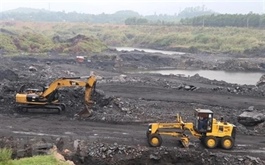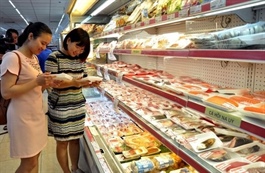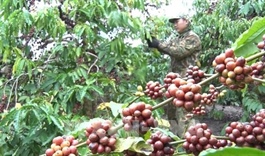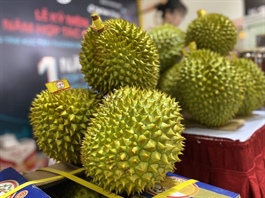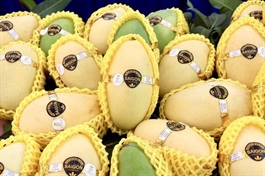Coffee exports reach record $5 billion
Coffee exports reach record $5 billion
Vietnam needs a plan to build a brand for Vietnamese robusta coffee in foreign markets.
Thai Nhu Hiep, vice-chairman of the Vietnam Coffee and Cocoa Association (VICOFA), told Lao Dong newspaper about solutions to boost Vietnam's coffee export earnings to US$5 billion or more.
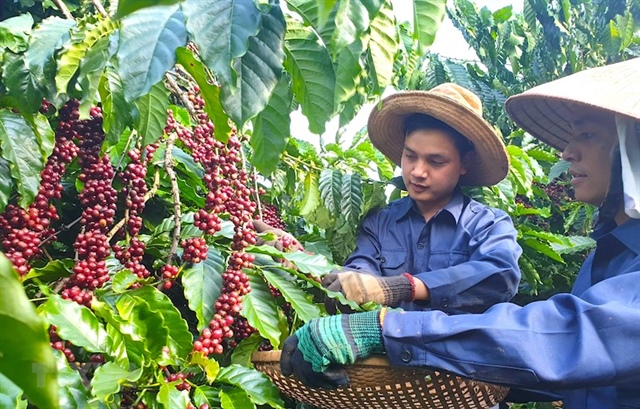
Vietnam is estimated to export US$5 billion worth of coffee this year. Photo: VNA |
How do you assess the situation of Vietnam's coffee exports in the first months of the year?
By the end of February 2024, Vietnam had exported nearly 700,000 tons of coffee. According to VICOFA's calculations, local enterprises can store about 350,000 to 400,000 tons of coffee, while household stock is about 150,000 to 200,000 tons.
As a result, Vietnam has a maximum of around 600,000 tons of coffee until the new harvest begins in October. Last year there was a shortage of coffee, and this year, the shortage is even greater, so the possibility of a price increase is high.
Global coffee supplies are under significant strain as India and Indonesia have tightened their supply of coffee for export, while Brazil, a major source, does not begin its harvest season until July.
What do you think the value of coffee exports will be this year?
This year is very unpredictable. The only thing we can be sure of is that the value of coffee exports will set a new record. It could exceed US$5 billion this year.
Coffee prices are through the roof, but Vietnamese farmers are not the big winners because their sales prices were so low. Even coffee exporters are losing money as they buy high and sell low. What is your view on this?

Thai Nhu Hiep, Vice Chairman of the Vietnam Coffee Cocoa Association. |
The first thing to note is that for the first time in 40 years of coffee cultivation, farmers are making high profits. The 2023-2024 coffee harvest has been delayed and will not end until December 2023, instead of October, as in previous years.
This year, most farmers didn't feel the pressure to sell early because they had other crops like durian. Some of the farmers who were making money from durian were buying more coffee to stockpile.
They saw the price of coffee as still low at VND60,000-70,000 ($2.4-2.8) per kg, as they earned VND500-700 million ($20-27,995)/ha/crop from durian and waited for higher prices to sell.
As far as coffee exporters are concerned, any company that misjudges supply and demand, fails to recognize the coffee shortage crisis and predicts the fall in coffee prices will bear the losses.
In contrast, pure coffee exporters, who buy coffee at the beginning of the season and sell it directly, are not losing money.
We hope that in the upcoming season, companies will make more accurate predictions about the main crop to ensure business efficiency.
Vietnamese Robusta coffee currently commands a very high price and is closing the gap with Arabica coffee. Does VICOFA have any programs to capitalize on this golden opportunity?
We plan to build the brand of Vietnamese robusta coffee in foreign markets. At present, global coffee roasters and processors depend on raw materials from Vietnam, so it is very suitable for building the brand. The product packaging should be labeled as Vietnamese coffee before it is sold to consumers.
What should coffee traders and processors do to ensure a stable raw material supply?
I believe it is necessary for them to work closely with farmers and share reasonable profits with them to ensure their commitment to coffee farming and to stabilize the supply of raw materials.
It is unlikely that farmers will massively expand their acreage after a bumper harvest like the one we have seen, as land is limited and they will choose which crops are economically efficient.
Vietnamese farmers are industrious and smart. VICOFA has been working with farmers in the coffee-growing regions to support sustainable production. Coffee growers have made many changes to their farming practices to reduce input costs, improve product quality and increase the value of their output.
At the moment, coffee farmers are doing well. This helps them regulate the amount of coffee they can sell, maintain selling prices, and avoid the situation of oversupply and falling prices that we have seen in the past.
Thank you!



